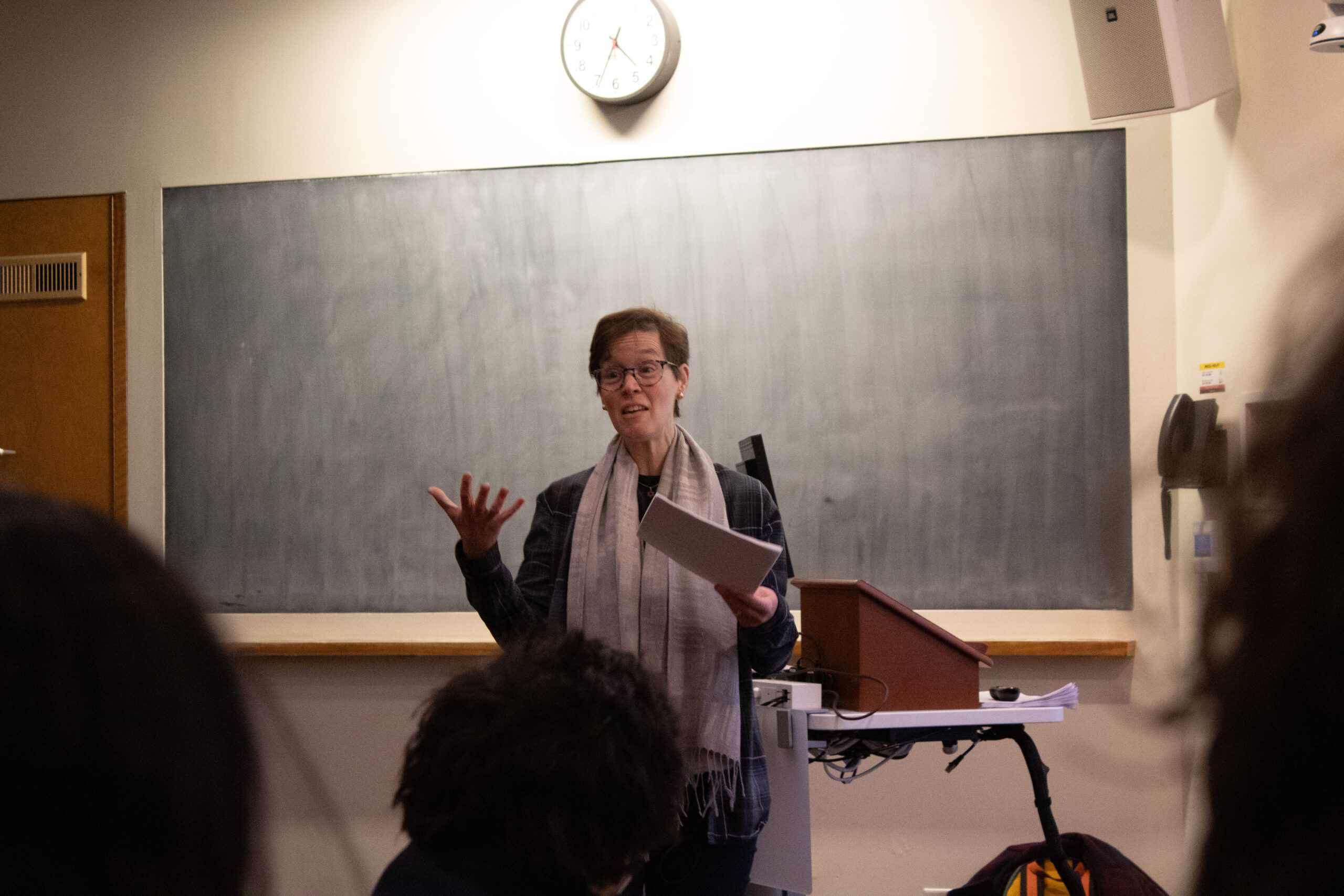Rabbi Lisa Vinikoor speaks on history of Zionism
February 7, 2025
 Janet Briggs
Janet BriggsAs a part of this year’s Interfaith Visibility Week, the Rachel Lord Center for Religious and Spiritual Life invited community members to the VAC’s Beam Classroom on Tuesday night for an educational event on Zionism. The event, entitled “Roots of Zionism,” was led by Rabbi Lisa Vinikoor and aimed to trace the historical, political and religious contours of Zionism.
During the hour-long program, attendees heard a brief lecture by Vinikoor and then engaged with primary sources written by founders of the modern Zionist movement. Vinikoor expressed her hope that the evening could clear up ambiguities about the history of the loaded term.
“We hear the word Zionism a lot on our campuses across the world right now, and I wanted to give [attendees] the opportunity to learn from the primary texts,” Vinikoor said in an interview with the Orient. “This was not a complete view because that would be really impossible to do in an hour, but I wanted to give a sense of the range of ideas.… And I just think looking at primary sources is interesting and a great way to do that.”
Vinikoor began the event by discussing the Biblical origins of Zionism, reading verses in the Hebrew Bible that describe the notion of a promised land for Jewish people in Palestine. She described the continued significance of Zion for the Jewish diaspora throughout history.
“Zion … has remained part of the Jewish hope and prayer and really was a symbol of peace and unity—this idea of returning to the promised land. That was very much a religious idea, an idea of hope and longing,” Vinikoor said. “In the Passover Seder, we have this refrain every year: We say, ‘Next year in Jerusalem.’ This idea that next year, maybe we’ll celebrate this important festival, this important holiday, in Jerusalem. And we’ve been saying this for nearly 2000 years.”
Vinikoor then transitioned to discussing more modern phenomena in the history of Zionism. She explained the advent of Jewish emancipation in the 18th and 19th centuries, in which many in the Jewish diaspora were granted legal citizenship in European nations but continued to face different forms of antisemitism, often violent, across the globe.
“In 1789, with the advent of the French Revolution, Jews were given full rights as citizens. But notably, the Jews were denied everything as a nation but granted everything as individuals. So this idea that a Jewish individual person may technically have more rights, but should they be interested in identifying as part of Jewish peoplehood—that was not accepted in that society.”
Vinikoor described widespread antisemitism that Jews faced across Europe and Russia during the 19th century, from employment discrimination to pogroms—violent organized massacres. She framed violence against Jews as the primary motivator for their initial migration to Palestine during this period.
Following her lecture, Vinikoor passed out packets to the audience containing quoted excerpts from 19th-century Zionist thinkers, including Theodore Hertzl and Vladimir Jabotinsky. Passages in the packet featured prominent Jewish voices in early Zionism, touching on themes of assimilation, nationalism and religious pride.
Some community members noted that Vinikoor’s talk neglected to acknowledge the often violent anti-Arab justifications for modern Zionism. Attendee Jonathan Lerdau ’25 expressed disappointment with the selected excerpts.
“[The excerpts] didn’t take into account the Palestinian perspective in any way. So when we look at those documents and we think about it like that, it’s important to think about what’s missing,” Lerdau said. “It’s difficult to talk about Herzl and Ahad Ha’Am and Jabotinsky and all these people without talking about the other side of it.… I think it’s hard to have a balanced conversation if you’re not addressing both sides of the situation.”
Vinikoor ended the event by acknowledging the limitations that a one-hour discussion presents for exploring such a complex and multi-faceted topic. She presented attendees with a list of materials for further study, which included books by Jewish authors and the film “My Promised Land” directed by Ari Shavit.
Jonah Bussgang ’25 attended Tuesday’s event and appreciated the evening’s conversation-based program.
“I really appreciated the space to have the small group discussions and to really dig into the texts and to not necessarily talk about [Zionism] in terms of generalizations,” Bussgang said. “This is the first conversation I’ve had at Bowdoin actually asking what is Zionism, and why do people care about it or not care about it, or where does it come from, rather than just assuming that we know what it is and having a feeling associated it … and to actually to have the space to dig into it and have the conversations. I was excited to have that here.”

Comments
Before submitting a comment, please review our comment policy. Some key points from the policy: